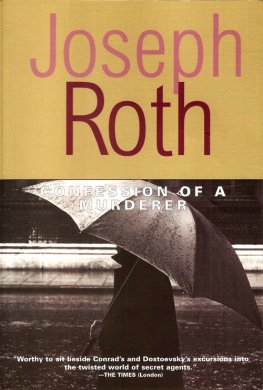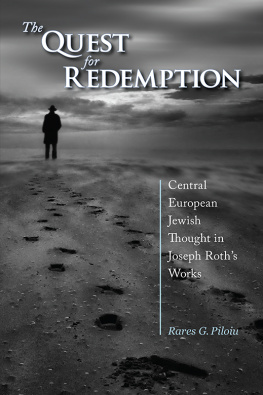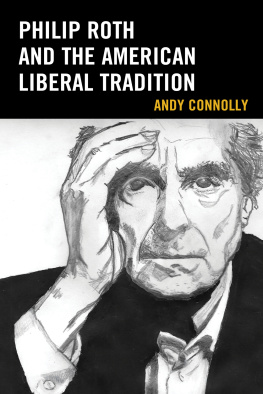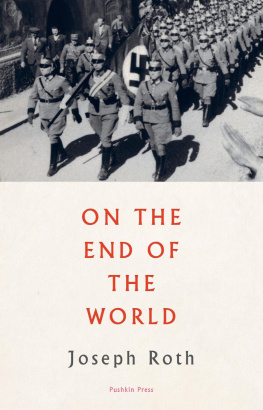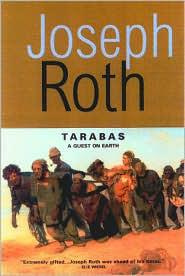Joseph Roth - Three Novellas
Here you can read online Joseph Roth - Three Novellas full text of the book (entire story) in english for free. Download pdf and epub, get meaning, cover and reviews about this ebook. year: 2003, publisher: The Overlook Press, genre: Prose. Description of the work, (preface) as well as reviews are available. Best literature library LitArk.com created for fans of good reading and offers a wide selection of genres:
Romance novel
Science fiction
Adventure
Detective
Science
History
Home and family
Prose
Art
Politics
Computer
Non-fiction
Religion
Business
Children
Humor
Choose a favorite category and find really read worthwhile books. Enjoy immersion in the world of imagination, feel the emotions of the characters or learn something new for yourself, make an fascinating discovery.
- Book:Three Novellas
- Author:
- Publisher:The Overlook Press
- Genre:
- Year:2003
- Rating:4 / 5
- Favourites:Add to favourites
- Your mark:
- 80
- 1
- 2
- 3
- 4
- 5
Three Novellas: summary, description and annotation
We offer to read an annotation, description, summary or preface (depends on what the author of the book "Three Novellas" wrote himself). If you haven't found the necessary information about the book — write in the comments, we will try to find it.
Three Novellas — read online for free the complete book (whole text) full work
Below is the text of the book, divided by pages. System saving the place of the last page read, allows you to conveniently read the book "Three Novellas" online for free, without having to search again every time where you left off. Put a bookmark, and you can go to the page where you finished reading at any time.
Font size:
Interval:
Bookmark:
Joseph Roth
Three Novellas
Fallmerayer the Stationmaster
TRANSLATED FROM THE GERMAN BY JOHN HOARE
I
The remarkable destiny of the Austrian stationmaster, Adam Fallmerayer, deserves without a doubt to be recorded and preserved. He lost his life, a life which, incidentally, would never have been brilliant and perhaps not even satisfying in the long run in the most bewildering way. Based on all the knowledge which people can have of one another, it would have been impossible to prophesy an unusual destiny for Fallmerayer. And yet it came to him, it seized him, and he even seemed to give himself up to it with a certain pleasure.
He had been a stationmaster since 1908. Soon after taking up his duties at the station at L, on the southern line, barely two hours distant from Vienna, he married the worthy, but somewhat limited and not particularly youthful daughter of a senior chancery official in Brums. It was a love-match, as it used to be called in those days when marriages of convenience were still customary and traditional. His parents were dead. When Fallmerayer married he nonetheless obeyed the very sober dictate of his very sober heart, not the promptings of his common sense. He begot two children, girls and twins. He had expected a son. It was fundamental to his nature to expect a son and to regard the simultaneous arrival of two girls as a painful surprise, if not as a hostile act of God. Since, however, he was secure from material worries and entitled to a pension, he accustomed himself, within a bare three months of the birth, to this bounty of nature, and began to love his children. To love: in other words to care for them with the overwhelming bourgeois conscientiousness of a father and a worthy official.
On a March day of the year 1914 Adam Fallmerayer was sitting, as usual, in his office. The telegraph ticked ceaselessly. Outside it was raining. It was an unseasonably early rain. The previous week they had still had to shovel the snow from the tracks and the trains were arriving and leaving dreadfully behind time. One night, all of a sudden, the rain began. The snow vanished, and opposite the little station, where the unattainable and dazzling splendor of the Alpine snow had seemed to praise the eternal lordship of winter, an indescribable blue-gray haze had for some days past blended clouds, sky, rain and mountain all into one. It rained, and the air was mild. Fallmerayer the stationmaster had never experienced such an early spring. The express trains which were heading south, to Meran, to Trieste and Italy never stopped at his tiny station. The expresses rushed unheedingly past Fallmerayer, who twice daily put on his brilliant scarlet cap and strode onto the platform to salute their passage. They almost degraded him to the level of signalman. The faces of the passengers behind the big windows melted into a gray-white pulp. Fallmerayer the stationmaster had seldom been able to descry the face of a passenger bound for the south, and the South meant more to the stationmaster than a mere geographical definition. The South was the sea, a sea of sunshine, freedom, happiness.
Certainly, a free railway pass for the whole familys holidays was to be numbered among the rights of senior officials of the southern railway. When the twins had been three years old they had journeyed to Bozen with them. They had taken the slow train for an hour to the station where the proud expresses stopped. They had climbed in, climbed out, and found themselves still a long way from the south. Their leave lasted four weeks. They saw rich people from all over the world and it seemed as though the very ones whom one saw were by coincidence the richest of all. They were not on leave. Their life was one long holiday. As far as one could see far and wide the richest people in the world had no twins; particularly not girls. And anyway it was the rich people who really brought the South to the south. An official of the southern railway lived permanently in the deep north.
So they traveled back and took up their duties afresh.
Fallmerayer looked up from his desk. It was five in the evening. Although the sun had not set it was dusk already, because of the rain. On the glass canopy of the platform the rain beat as unceasingly as the ticking of the telegraph, and it was a comfortable, uninterrupted dialogue between science and nature. The big, blueish flagstones beneath the platforms canopy were dry. But the tracks and between the tracks the little stones of the gravel glistened despite the darkness in the moist magic of the rain.
Although stationmaster Fallmerayers nature was not endowed with much fantasy, it nevertheless seemed to him that this day was quite particularly pregnant with Fate, indeed he began to tremble as he looked out of the window. The express to Meran was due in thirty-six minutes. In thirty-six minutes, so it seemed to Fallmerayer, night would be absolute, a night to be feared. Above his office, on the first floor, the twins were running wild, as usual. He could hear the patter of their childish and yet rather brutal footsteps. He opened the window. It was no longer cold. Spring had come down from over the mountains. One could hear the whistle of engines shunting, as one did every day, and the calls of the railwaymen and the dull thudding shock of the coupled wagons. All the same, today the locomotives had a special whistle, or so it seemed to Fallmerayer. He was quite an ordinary person, and nothing seemed odder to him than thinking he detected on this day, among the usual and quite unsurprising noises, the sound of an uncommon destiny. In fact, it was on this day that the terrifying catastrophe happened, as the result of which Adam Fall merayers life was to be completely altered.
II
The express had already been announced as a little late on leaving B. Two minutes before it was due through L it collided, as the result of a set of points being misplaced, with a stationary goods train. The catastrophe was there. Hastily grasping some entirely ineffective lanterns, Fallmerayer the stationmaster ran along the tracks towards the site of the disaster. He had felt the need to grasp some concrete object. It seemed to him out of the question that he should run towards the trouble with empty, as it were weaponless, hands. He ran for ten minutes, coatless, the rain whipping ceaselessly against his neck and shoulders.
By the time he reached the scene of the accident, people had just begun to pull out the dead, the injured and the trapped. It grew darker than ever, as if night itself were hurrying to do justice to the first shock and to increase it. The fire brigade came from the little town with flares which crackled and hissed as they fought to beat off the rain. Thirteen coaches lay splintered on the tracks. They had dragged out the driver and his fireman. They were both dead. Railwaymen, firemen and passengers labored at the wreck with anything they could lay their hands on. The injured cried piteously, the rain poured down, the flares hissed. The stationmaster was freezing in the rain. His teeth chattered. He had the feeling that he should be doing something, like the others, but at the same time he was afraid that they might prevent him from helping because it was possible that he himself might have been responsible for the accident. Now and again one or other of the railwaymen who knew him greeted him fleetingly in the urgency of their duty, and Fallmerayer would attempt tonelessly to say something which might equally easily have been an order or a prayer for forgiveness. But nobody heard him. He had never before felt himself so superfluous on this world. He was just beginning to regret that he himself had not been among the victims, when his eye aimlessly fell on a woman who had just been laid on a stretcher. There she lay, abandoned by her rescuers, her great dark eyes bent on the flares nearest to her, covered to her hips in a silver-gray fur coat, and obviously in no condition to move. The rain fell incessantly on her pale broad face and the light of the flares flickered over her. Her face gleamed, wet and silvery, in the magical interchange of flame and shadow. Her long white hands lay on her coat, motionless also, like two wondrous corpses. It seemed to the stationmaster that this woman on her stretcher was lying in a great white island of peace in the midst of a deafening sea of sound and fury, that she even emanated silence. In fact, it seemed as though all the hurrying, busy people wished to make a detour about the stretcher on which the woman lay. Was she already dead? Fallmerayer the stationmaster slowly approached the stretcher.
Font size:
Interval:
Bookmark:
Similar books «Three Novellas»
Look at similar books to Three Novellas. We have selected literature similar in name and meaning in the hope of providing readers with more options to find new, interesting, not yet read works.
Discussion, reviews of the book Three Novellas and just readers' own opinions. Leave your comments, write what you think about the work, its meaning or the main characters. Specify what exactly you liked and what you didn't like, and why you think so.






